新目标七年级下Unit
新目标英语7年级下单词表(带音标)

新目标英语七年级下册单词表Unit 1 Can you play the guitar?guitar /ɡɪ'tɑ:(r)/ n. 吉他sing/[sɪŋ/ v. 唱;唱歌swim /swɪm/ v. & n. 游泳dance /dɑːns/, /dæns/ v.跳舞n. 舞蹈draw /drɔː/ v. 画chess /tʃes/ n. 国际象棋play chess 下国际象棋speak /spiːk/ v. 说(某种语言);说话speak English 说英语join /dʒɔɪn/ v. 参加;加入club /klʌb/ n. 俱乐部;社团be good at… 擅长于……tell / tel / v. 讲述;告诉story /'stɔːrɪ/ n. 故事;小说write /raɪt/ v. 写作;写字show /ʃəʊ/ n. 演出;节目v. 给……看;展示;or /ɔː(r)/ conj. 或者;也不(用于否定句)talk /tɔːk/ v. & n. 说话;交谈talk to … 跟……说kungfu /,kʌŋ’fuː/ n.(中国)功夫drum /drʌm/ n. 鼓play the drums 敲鼓piano /pɪ'ænəʊ/ n. 钢琴play the piano 弹钢琴violin /,vaɪə'lɪn/ n. 小提琴play the violin 拉小提琴also /'ɔːlsəʊ/ adv. 也;而且people /'piːpl/ n. 人;人们home /həʊm/ n. 家;活动本部adv. 到家;在家be good with… 善于应付……的;对……有办法make /meɪk/ v. 使成为;制造make friends 结交朋友today /tə'deɪ/ adv. 在今天help (sb) with sth 在某方面帮助(某人)center ['sentə(r)] n.(=centre)中心;中央weekend /,wiːk'end/, / 'wiː kend/ n. 周末on the weekend (在)周末teach /tiːtʃ / v教;讲授musician /mjuː'zɪʃn/ n. 音乐家Lisa /'li:zə/ 莉萨(女名)Jill /dʒɪl/ 吉尔(女名)Peter /'piːtə(r)/ 彼得(男名)Unit 2 What time do you go toschool?up /ʌp/ adv. 向上get up 起床;站起dress /dres/ v. 穿衣服n. 连衣裙get dressed 穿上衣服brush /brʌʃ/ v. 刷刷净n.刷子tooth /tuːθ/ n. (pl. teeth [tiːθ] ) 牙齿shower /'ʃaʊə/ n. & v. 淋浴n. 淋浴器(间)take a shower 洗淋浴usually /'ju:ʒuəli/ adv. 通常地;一般地forty /'fɔ:(r)ti/ num. 四十wow /waʊ/ interj.(表示惊奇或敬佩)哇;呀never /'nevə(r)/ adv. 从不;绝不early /'ɜːlɪ/ adv. & adj. 早(的)fifty /'fɪftɪ/ num. 五十job /dʒɒb/, /dʒɑːb/ n.工作;职业work /wɜːk/ v. & n. 工作station /'steɪʃn/ n. 电(视)台;车站radio station 广播电台o'clock /ə'klɒk/, /ə'klɑ:k/ adv.(表示整点)……点钟night /naɪt/ n. 晚上;夜晚funny /'fʌnɪ/ adj. 奇怪的;滑稽好笑的exercise /'eksəsaɪz/ v. & n. 锻炼;练习on weekends (在)周末best /best/ adj. 最好的adv. 最好地;最group /gruːp/ n. 组;群half /hɑːf/, /hæf/ n. & pron. 一半;半数past /pɑːst/, /pæst/ prep. 晚于;过(时间)adj. 过去的quarter /'kwɔː(r)tə(r)/ n.一刻钟;四分之一homework/'həʊmwɜː(r)k/ n. 家庭作业do (one’s) homework 做作业run /[rʌn/ v. 跑;奔clean /kliːn/ v. 打扫;弄干净adj. 干净的walk /wɔːk/ n. & v. 行走;步行take a walk 散步;走一走quickly /'kwɪkli/ adv. 很快地either /'aɪðə(r)/, / 'iː ðə(r) / adv. 或者;也(用在否定词组后)either…or … 要么……要么……;或者……或者……lot /lɒt/, /lɑ:t/ pron. 大量;许多lots of 大量;许多sometimes /'sʌmtaɪmz/ adv. 有时taste /teɪst/ v. 有……的味道;品尝n.味道;滋味life /laɪf/ n. 生活;生命Rick /rɪk/ 里克(男名)Jim /dʒɪm/ 吉姆(男名)Scott /skɒt/, /skɑ:t/ 斯科特(男名)Tony ['təʊnɪ] 托尼(男名)Unit 3 How do you get to school?train /treɪn/ n. 火车bus /bʌs/ n. 公共汽车;公交车subway /'sʌbweɪ/ n. 地铁take the subway 乘地铁ride /raɪd/ v. 骑n. 旅程bike /baɪ k/ n. 自行车ride a bike 骑自行车sixty /'sɪkstɪ/ num. 六十seventy/'sevntɪ/ num. 七十eighty/'eɪtɪ/ num. 八十ninety/'naɪntɪ/ num. 九十hundred /'hʌndrəd/ num. 一百minute /'mɪnɪt/ n. 分钟far /fɑː/ adv. & adj. 远;远的kilometer /'kɪlə,mitə(r)/ n. 公里new /njuː/ adj. 新的;刚出现的every /'evrɪ/ adj. 每一;每个every day 每天by /baɪ/ prep. (表示方式)乘(交通工具)by bike 骑自行车drive /draɪv/ v. 开车car /kɑː/ n. 小汽车;轿车live /lɪv/ v. 居住;生活stop /stɑ:p/ /stɒp/ n. 车站;v. 停止think of 认为cross /krɒs/ v. 横过;越过river /'rɪvə/ n. 河;江many /'menɪ/ adj. & pron. 许多village /['vɪlɪdʒ/ n. 村庄;村镇between /bɪ'twiːn/ prep. 介于…之间between… and… 在……和……之间bridge /brɪdʒ/ n. 桥boat /bəʊt/ n. 小船ropeway /['rəʊpweɪ/ n.索道year /jɪə/ / jɜː/ n. 年;岁afraid [ə'freɪd] adj. 害怕;惧怕like /laɪk/ prep. 像;leave /liːv/ v. 离开dream /driːm/ n. 梦想;睡梦v. 做梦true /truː/ adj. 真的;符合事实的come true 实现;成为现实Dave /deiv/ 戴夫(男名)Unit 4 Don’t eat in class.rule /ruːl/ n. 规则;规章arrive /ə'raɪv/ v. 到达(be) ontime 准时hallway /'hɔːlweɪ/ n. 走廊;过道hall /hɔːl/ n. 大厅;礼堂dining hall 餐厅listen /'lɪs(ə)n/ v. 听;倾听listen to… 听……fight /faɪt/ v. & n. 打架;战斗sorry /'sɒrɪ/ adj. 抱歉的;难过的;惋惜的outside /aʊt'saɪd; 'aʊtsaɪd/ adv.在外面adj. 外面的wear /weə/ v. 穿;戴important/ɪm'pɔːt(ə)nt/ adj. 重要的bring /brɪŋ/ v. 带来;取来uniform /'juːnɪfɔːm/ n. 校服;制服quiet /'kwaɪət/ adj. 安静的out /aʊt/ adv. 外出go out 外出(娱乐)practice /'præktɪs/ v. & n.练习dish /dɪʃ/ n. 碟;盘do the dishes 清洗餐具before /bɪ'fɔː/ prep. & conj.在… 以前adv.以前make (one’s) bed 铺床dirty /'dɜːtɪ/ adj. 脏的kitchen /'kɪtʃɪn/ n. 厨房more /mɔː/ adj. & pron. 更多的noisy /'nɒɪzɪ/adj. 吵闹的relax /rɪ'læks/v. 放松;休息read /riːd/ v. 读;阅读terrible /'terɪb(ə)l/ adj. 非常讨厌的;可怕的feel /fiːl/ v. 感受;觉的strict /strɪkt/ adj. 严格的;严厉的be strict (with sb) (对某人)要求严格remember /rɪ'membə/ v. 记住;记起follow /'fɒləʊ/ v. 遵循;跟随follow the rules 遵守规则luck /lʌk/ n. 幸运;运气keep /kiːp/ v. 保持;保留hair /heə/ n. 头发;毛发learn /lɜːn/ v. 学习;学会Clark /kla:k/ 克拉克(姓;男名)Amy /eɪmɪ/ 埃米(女名)Molly /'mɒlɪ/莫莉(女名)New York /nju: jɔ:k/ 纽约Unit5 What do you like pandaspanda/'pændə/ n.熊猫zoo/zuː / n.动物园tiger/'taɪ gə(r)/ n.老虎elephant/'elɪ fənt/ n.大象koala/kəʊ 'ɑː lə/ n.树袋熊lion/'laɪən/ n.狮子giraffe/dʒə'rɑː f/ n.长颈鹿animal/'ænɪ ml/ n .动物cute/kjuː t/ adj.可爱的;机灵的lazy/'leɪ zɪ / adj.懒散的;懒惰的smart/smɑː (r)t/ adj 聪明的beautiful/'bjuː tɪ fl/ adj 美丽的;美好的scary/'skeərɪ /adj 吓人的;恐怖的kind/kaɪ nd/n 种类kind of 稍微;有点儿Australia/ɒ 'streɪ lɪə/ n.澳大利亚south/saʊθ/ adj.南方的n.南;南方Africa/'æfrɪ kə/ n.非洲South Africa 南非pet/pet/ n. 宠物leg/leg/ n.腿cat/kæt/ n. 猫sleep/sliː p/ n.睡觉friendly/'frendlɪ / adj .友好的shy/ʃ aɪ / adj.羞怯的;腼腆的save/seɪ v/ v .救;救助symbol/'sɪ mbl/ n.象征flag/flæg/ n. 旗;旗帜forget/fə'get/ v.忘记;遗忘get lost 迷路place/pleɪ s/ n .地点;位置water/'wɔː tə/ n.水danger/'deɪ ndʒə/ n. 危险be in (great) danger 处于(极大)危险之中cut/kʌ t/ v .砍;切down/daʊn/ adv.(坐、躺、倒)下prep. 向下;沿着cut down 砍倒tree/triː / n.树kill/kɪ l/ v.杀死;弄死ivory/'aɪ vərɪ /n.象牙over/'əʊ və/ prep .超过;多于;在… 上方(be) made of 由……制成的Julie/'dʒuː lɪ /朱莉(女名)Becky/'bekɪ /贝姬(女名)Thailand/'taɪ lænd/n.泰国Thai/taɪ /n.泰国(人的);泰语(的) Unit6 I’m watching TVnewspaper /'njuː zpeɪ pə/ n .报纸read a newspaper 看报纸use/juː z/ v.使用;运用soup/suː p/ n.汤make soup 做汤wash/wɒʃ / v.洗movie/'muː vɪ / n.电影go to the movies 看电影just/dʒʌ st/ adv .只是;恰好eat out 出去吃饭house/haʊ s/ n.房子drink/drɪŋk/ v.喝n.饮料tea/tiː / n.茶;茶叶drink tea 喝茶tomorrow/tə'mɒ rəʊ / adv.在明天n.明天;未来pool/puː l/ n.游泳池;水池shop/ʃɒ p/ v.购物n.商店supermarket/'suː pəmɑː kɪ t/n. 超市man/mæn/ n 男人;人race /reɪ s/n.竞赛host/həʊ st/ n.主人;东道主study/'stʌ dɪ / v. &n.学习;研究state/steɪ t/ n 洲theUnited States/juː 'naɪ tɪ d 'steɪ ts/ (of America)美国;美利坚合众国American/ə'merɪ kən/adj.美国的;美洲的n 美国人;美洲人dragon /'drægən/ n.龙Dragon Boat Festival 端午节any/'enɪ / adj.任何的.任一的pron.任何; 任一other/'ʌðə(r)/adj.另外的;其他的pron.另外的人(或物)young/jʌŋ/ adj.幼小的,年轻的child /tʃ aɪ ld/ n.儿童(pl.children /'tʃɪ ldrən/ )miss /mɪ s/ v.怀念. 思念wish /wɪʃ /v.希望delicious/dɪ 'lɪʃəs/ adj.可口的.美味的still /stɪ l/adv. 还.仍然living room /'lɪ vɪŋruː m/ 客厅Steve/stiː v/史蒂夫(男名)Laura/lɔː rə/劳拉(女名Unit7 It's raining!rain/reɪ n/ v.下雨n.雨水windy/'wɪ ndɪ / adj.多风的cloudy/'klaʊ dɪ / adj.多云的sunny/'sʌ nɪ / adj.晴朗的snow/snəʊ / v.下雪;雪weather/'weðə/ n.天气cook/kʊ k/ v.做饭bad /bæd/ adj.坏的;糟的park /pɑ ː k/ n.公园message/'mesɪ dʒ / n.信息;消息take a message 捎个口信;传话him/hɪ m/ pron.他(he 的宾格)could/kʊ d/ v.能;可以back /bæk/ adj.回来;回原处call (sb.) back 回电话problem/'prɒ bləm/ n.困难;难题again /ə'ɡ en; ə'ɡ eɪ n/ adj.再一次;又一次dry/draɪ /adj.干燥的cold/kəʊ ld/ adj.寒冷的;冷的hot /hɒ t/ adj.热的warm /wɔː (r)m/ adj.温暖的visit /'vɪ zɪ t/ v.拜访;参观Canada /'kænədə/ n.加拿大summer/'sʌ mə(r)/ n.夏天;夏季sit/sɪ t/ v.坐juice/dʒuː s/ n.果汁;饮料soon/suː n/ adv.不久;很快vacation /və'keɪʃ n/n.假期on(a)vacation 度假hard /hɑ ː d/ adv.努力地;困难的Europe/'jʊ rəp/ n.欧洲mountain/'maʊ ntən/ n.高山country/'kʌ ntrɪ / n.国;国家skate /skeɪ t/ v.滑冰snowy/'snəʊɪ / adj.下雪的winter/'wɪ ntə/ n.冬天;冬季Russian/'rʌʃ n/ adj.俄罗斯的;俄罗斯人;俄语snowman /'snəʊ mæn/n.雪人rainy /'reɪ nɪ / adj.阴雨的;多雨的Joe/dʒəʊ /乔(男名)Jeff/dʒ ef/ 杰夫(男名)Moscow/'mɒ skəʊ /莫斯科Toronto /tə'rɒ ntəʊ / 多伦多Boston/'bɒ stən/ 波士顿Unit8 Is there a post office near here? post/pəʊ st/ n.邮政office/'ɒ fɪ s/ n. 办公室post office 邮局police /pə'liː s/ n.警察police station /'steɪʃən/警察局hotel/həʊ 'tel/ n.旅店;酒店restaurant/'restrɒ nt/ n.餐馆bank/bæŋk/ n.银行hospital/'hɒ spɪ tl/ n.医院street /striː t/n.大街pay/peɪ /v.付费pay phone 付费电话near /nɪə/prep.在……附近across /ə'krɒ s/adv.过;穿过across from 在……对面front /frʌ nt/n.前面in front of 在……前面behind /bɪ 'haɪ nd/prep.在……后面town /taʊ n/ n.镇;市镇around /ə'raʊ nd/ adv.&prep.到处;大约north /nɔː θ/ n.北;北方adj.北方的along /ə'lɒŋ/ prep.沿着go along the street 沿着(这条街)走turn/tɜː n/ v.转向;翻right/raɪ t/ adv.向右边;n.右边left /left/ adv.向左边n.左边turn right /left 向右、左转crossing/'krɒ sɪŋ/ n.十字路口neighborhood /'neɪ bə(r)hʊ d/ n.街区;街坊spend /spend/ v.花(时间、钱等)spend time 花时间climb /klaɪ m/ v.爬road /rəʊ d/ n.路often/'ɒ fn/ adv.时常;常常air/eə/ n.空气sunshine/'sʌ nʃ aɪ n/n.阳光free/friː / adj.免费的enjoy/ɪ n'dʒɒɪ / v.享受;喜爱enjoy reading 喜欢阅读easily/'iː zɪ lɪ / adv.容易地money/'mʌ nɪ / n.钱Unit9 What does he look like?curly/'kɜː lɪ / adj.卷曲的straight/streɪ t/ adj.直的tall/tɔː l/ adj.高的medium/'miː dɪəm/ adj. 中等的height/haɪ t/ n.身高;高度of medium height 中等身高thin/θɪ n/ adj.瘦的heavy/'hevɪ / adj.重的build/bɪ ld/ n.身材of medium build 中等身材tonight/tə'naɪ t/ adv.&n.今夜little /'lɪ tl/ adj.小的a little 一点,少量cinema /'sɪ nɪ mə/ n.电影院glasses /'glɑ ː sɪ z/ n.眼镜later/'leɪ tə/ adj.以后handsome /'hænsəm/ adj.英俊的actor/'æktə/ n.演员actress/'æktrɪ s/ n.女演员person/'pɜː sn/ n.人nose/nəʊ z/ n.鼻子blonde /blɒ nd/ adj.金黄色的mouth/maʊθ/ n.嘴round/raʊ nd/ adj.圆形的face/feɪ s/ n.脸eye/aɪ / n.眼睛singer/'sɪŋə(r)/ n.歌手artist/'ɑ ː tɪ st/ n.艺术家crime/kraɪ m/ n.犯罪活动criminal/'krɪ mɪ nl/ n.罪犯put/pʊ t/ v.放each/iː tʃ / adj.&pron.每个,各自way/weɪ / n.方式,路线describe /dɪ 'skraɪ b/ v.描述differently/'dɪ fərəntlɪ / adv.不同地another/ə'nʌ ðə/ adj.&pron 另一,又一end/end/ n.结尾,尽头in the end 最后real/riː l/ adj.真正的;真实的jeans/dʒiː nz/ n.牛仔裤Johnny/'dʒɒ nɪ / 约翰尼(男名)Dean/diː n/迪安(姓)Tina/'tiː nə/蒂娜(女名)Jackson/'dʒ æksn/ 杰克逊(姓)Unit10 I'd like some noodles.noodle/'nuː dl/ n.面条mutton/'mʌ tn/ n.羊肉beef/biː f/ n.牛肉cabbage/'kæbɪ dʒ / n.卷心菜;洋白菜potato/pə'teɪ təʊ / n.土豆;马铃薯special/'speʃəl/ n.特色菜;特价品;特别的;特殊的would/wʊ d/ v.(表示意愿)愿意would like 愿意;喜欢yet/jet/ adv.(常用于否定句或疑问句)还;仍然large/lɑ ː dʒ / adj.大号的;大的order/'ɔː də/ n.&v.点菜;命令take one's order 点菜size/saɪ z/ n.大小;尺码bowl/bəʊ l/ n.碗one(large)bowl of 一(大)碗tofu/'təʊfuː / n 豆腐meat/miː t/ n.(可食用的)肉dumpling/'dʌ mplɪŋ/ n.饺子porridge/'pɒ rɪ dʒ / n.粥;面糊onion/'ʌ njən/ n.洋葱fish/fɪʃ / n.鱼;鱼肉pancake/'pænkeɪ k/ n.烙饼;薄饼world/wɜː ld/ n.世界around the world 世界各地answer/'ɑ ː nsə/ n.答案v.回答different/'dɪ fərənt/ adj.不同的cake/keɪ k/ n.蛋糕candle/'kændl/ n.蜡烛age/eɪ dʒ / n.年龄make a wish 许愿blow/bləʊ / v.吹blow out 吹灭if/ɪ f/ conj.如果will/wɪ l/ v.会the UK/,juː 'keɪ/(=the Kingdom/juː 'naɪtɪd 'kɪŋdəm/ n.英国candy/'kændɪ / n.糖果lucky/'lʌ kɪ / adj.幸运的popular/'pɒpjuː lə/ adj.受欢迎的;普遍的get popular 受欢迎;流行cut up 切碎idea/aɪ 'dɪə/ n.想法;主意bring good luck to…给……带来好运Unit11 How was your school trip?milk/mɪ lk/ v.挤奶cow/kaʊ / n.奶牛milk a cow 给奶牛挤奶horse/hɔː (r)s/ n.马ride a horse 骑马feed/fiː d/ v.(fed/fed/)喂养;饲养feed chickens 喂鸡farmer/'fɑ ː (r)mə(r)/ n.农民;农场主quite/kwaɪ t/ adv.相当;安全quite a lot(of…) 许多anything/'enɪθɪŋ/ pron. (常用于否定句或疑问句)任何东西;任何事物grow/grəʊ/ v. (grew/gruː /)种植;生长;发育farm/fɑ ː (r)m/ n.农场; 务农;种田pick/pɪ k/ v.采;摘excellent/'eksələnt/ adj.极好的;优秀的countryside /'kʌ ntrɪ saɪ d/ n.乡村;农村in the countryside 在乡下;在农村yesterday/'jestə(r)dɪ / n.昨天flower/'flaʊə(r)/ n.花worry/'wʌ rɪ / v.担心;担忧luckily/'lʌ kɪ lɪ / adv.幸运地;好运地sun/sʌ n/ n.太阳museum/mjuː 'zɪəm/ n.博物馆fire/'faɪə/ n.火灾fire station 消防站painting/'peɪ ntɪŋ/n.油画;绘画exciting/ɪ k'saɪ tɪŋ/ adj.使人兴奋的;令人激动的lovely/'lʌ vlɪ / adj.可爱的expensive/ɪ k'spensɪ v/ adj.昂贵的cheap/tʃiː p/ adj.廉价的;便宜的slow/sləʊ / adj.缓慢的;迟缓的fast/fɑ ː st/ adv.&adj.快地(的)robot/'rəʊ bɒ t/ n.机器人guide/gaɪ d/ n.导游;向导gift/gɪ ft/ n.礼物;赠品all in all 总的说来everything/'evrɪθɪŋ/ pron.一切;所有事物interested/'ɪ ntrɪ stɪ d/ adj.感兴趣的be interested in 对……感兴趣dark/dɑ ː (r)k/ adj.黑暗的;昏暗的hear /hɪə/v. (heard/hɜː d/)听到;听见Carol /'kærəl/卡罗尔(女名)Unit12 What did you do last weekend? camp/kæmp/ v.扎营;扎帐篷lake/leɪ k/ n.湖,湖泊beach/biː tʃ / n.海滩,沙滩badminton/'bædmɪ ntən/ n.羽毛球运动sheep/ʃiː p/ n.羊,绵羊as/æz/ adv.&pron 作为,当做natural /'nætʃərəl/pron.自然的butterfly/'bʌ tə(r)faɪ / n.蝴蝶visitor /'vɪ zɪ tə(r)/n.游客;访问者tired/taɪəd/ adj.疲倦的stay/steɪ / v.停留stay up late 深夜不留away/ə'weɪ / adv.离开run away 跑开mouse/maʊ s/ n.老鼠baby/'beɪ bɪ / n.幼小的shout/ʃ aʊ t/ v.呼叫,喊叫shout at…冲……大声叫嚷woof/wʊ f/ interj.(狗叫声)汪汪language/'læŋgwɪ dʒ / n.语言fly/flaɪ/ v. (fly/fluː /)飞kite/kaɪ t/ n.风筝fly a kite 放风筝high/haɪ / adj.&adv.高的(地)high school 中学ago/ə'gəʊ / adv.以前India/'ɪ ndɪə/ n.印度tent/tent/ n.帐篷put up 搭起,举起moon/muː n/ n.月亮surprise/sə(r)'praɪ z/ n.&v.惊奇,惊讶get a surpris 吃惊snake/sneɪ k/ n.蛇scared/skeəd/ adj.惊慌的move/muː v/ v.移动shout to…对……大声喊叫start/stɑ ː (r)t/ v.开始,着手jump/dʒʌ mp/ v.跳跃up and down 上上下下wake/weɪ k/ v.(woke/wəʊ k/)弄醒,醒into/'ɪntuː / prep.到……里面forest/'fɒ rɪ st/ n.森林ear/ɪə/ n.耳朵Lucy/'lusɪ /露西(女名)。
新目标七年级英语下册Unit 2教案
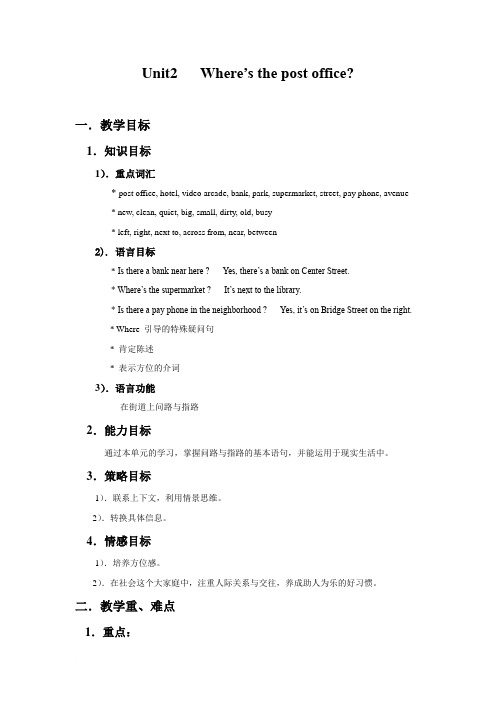
Unit2 Where’s the post office?一.教学目标1.知识目标1).重点词汇* post office, hotel, video arcade, bank, park, supermarket, street, pay phone, avenue* new, clean, quiet, big, small, dirty, old, busy* left, right, next to, across from, near, between2). 语言目标* Is there a bank near here ? Yes, there’s a bank on Center Street.* Where’s the supermarket ? It’s next to the library.* Is there a pay phone in the neighborhood ? Yes, it’s on Bridge Street on the right.* Where 引导的特殊疑问句* 肯定陈述* 表示方位的介词3).语言功能在街道上问路与指路2.能力目标通过本单元的学习,掌握问路与指路的基本语句,并能运用于现实生活中。
3.策略目标1).联系上下文,利用情景思维。
2).转换具体信息。
4.情感目标1).培养方位感。
2).在社会这个大家庭中,注重人际关系与交往,养成助人为乐的好习惯。
二.教学重、难点1.重点:1).表方位的介词:near、across from、next to、between、on2).问路与指路的基本语句2.难点:1).本单元词汇量较大(生词表中列出44个单词,9条短语;课文中还有一些短语)。
2).个别句子有一定难度,如:* Is there a big supermarket near where you live ?* Turn left off the busy First Avenue and enjoy the city’s quiet streets and smallparks.* ┉ there is a small house with an interesting garden.* Bridge Street is a good place to have fun.三.难点注释:* Is there a big supermarket near where you live ?在你住处附近有一家大超市吗?* Turn left off the busy First Avenue and enjoy the city’s quiet streets and smallparks.向左转走出/驶离繁华的第一大道,即可享受到城区里安静的街道和小公园。
新目标七年级下Unit1

2b Listen again. Complete the sentences.
1. Lisa wants to join the _ch__es_s_ club, but she can’t play _c_h_e_s_s_.
- Can you play the drums? - Yes, I can. - No, I can’t. (can’t=can not)
- Can you play the violin? - Yes, I can. - No, I can’t. (can’t=can not)
- Can you play tennis? - Yes, I can. - No, I can’t. (can’t=can not)
Yes, I can.
No, I can’t.
Can you speak English? Yes, we can. Can you speak French? No, we can’t.
Can you draw? Yes, I can. Can you draw well? Yes, I can./ No, I can’t.
Pair work
2d Role-play the conversation.
Jane: Hi, Bob. What club do you want to join?
Bob: I want to join a sports club. Jane: Great! What sports can you play? Bob: Soccer. Jane: So you can join the soccer club.
人教版新目标七年级下册Unit1_12重点短语及句型归纳
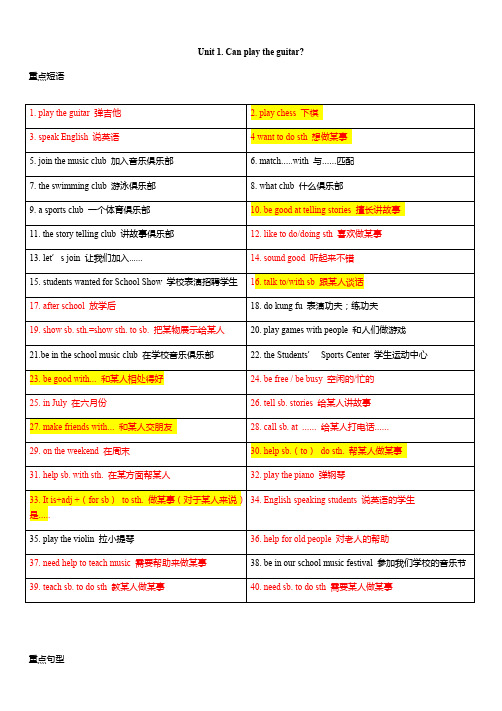
Unit 1. Can play the guitar?重点短语重点句型1. —Can you swim?你会游泳吗?—No,I can’t.不,我不会。
2. Can you play the guitar?你会弹吉他吗?3. I want to join the art club.我想参加艺术俱乐部.4. What club do you want to join?你想参加什么俱乐部?5. You are very good at telling stories.你非常擅长讲故事。
6. Sounds good. But I like to draw,too.听起来不错。
但我也喜欢画画。
7. Then join two clubs—the story telling club and the art club!那么就请加人两个俱乐部——讲故事俱乐部和艺术俱乐部。
8. 一Can Wu Jun speak English?吴俊会讲英语吗?一No,he can’t, but he can speak Chinese.不会,但他会讲汉语。
9. Are you good with old people?你与老人们相处得融洽吗?10. Can you play the piano or the violin?你会弹钢琴还是会拉小提琴?Unit 2 What time do you go to school?重点短语重点句型1. What time do you go to school?你几点去上学?2. 一What time do you usually take a shower,Kick?瑞克,你通常几点钟淋浴?—I usually take a shower at six forty.我通常六点四十淋浴。
3. 一When do you go to work? 你什么时候去上班?一At eleven o’clock, so I’m never late for work.十一点,我上班从来没有迟到4. —What time do they get dressed?他们几点钟穿上衣服?一They always get dressed at seven twenty.他们总是七点二十穿上衣服。
(新)人教版新目标七年级英语下册(Unit7-Uni8)集体备课教案设计
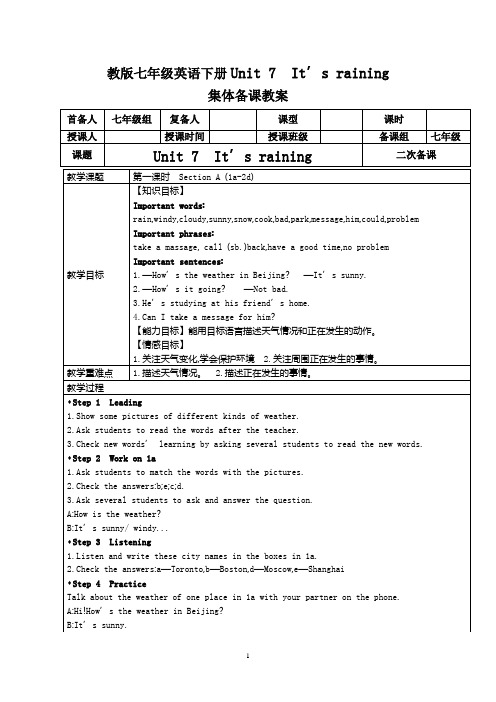
Learn the sentences in Grammar Focus by heart.
板书设计
Section A(Grammar Focus-3b)
重点短语
1.talk on the phone
2.make soup
3.right now
重点句型
1.How’s the weather?—It’s cloudy./ It’s sunny./ It’s raining.
课时
授课人
授课时间
授课班级
备课组
七年级
课题
Unit 7It’s raining
二次备课
教学课题
第二课时Section A(Grammar Focus-3b)
教学目标
【知识目标】
Important word:again
Important phrases:
every Saturday,play basketball,in the park,talk on the phone,make soup,right now,study Chinese
Important phrases:
take a massage,call(sb.)back,have a good time,no problem
Important sentences:
1.—How’s the weather in Beijing?—It’s sunny.
2.—How’s it going?—Not bad.
Keys:1.cloudy2.raining3.sunny4.windy5.snowing
Ⅱ.根据汉语意思完成句子
1.她在公园正玩得开心。
七年级新目标下Unit_2_What_time_do_you_go_to_school教案
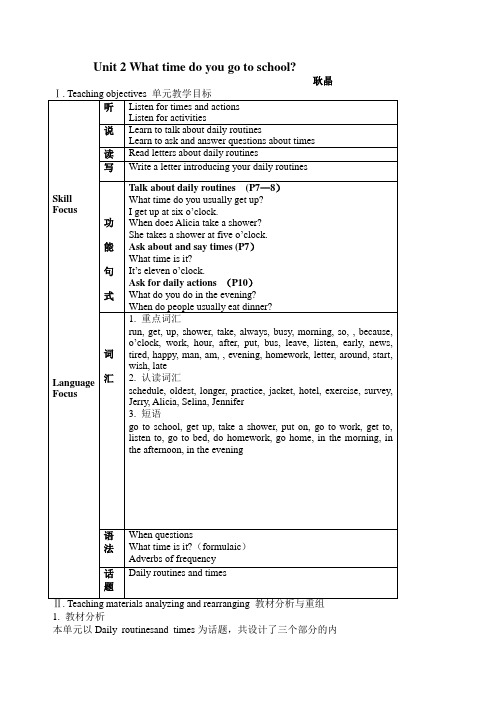
Unit 2 What time do you go to school?耿晶1. 教材分析本单元以Daily routinesand times为话题,共设计了三个部分的内容。
旨在通过单元教学使学生学会谈论日常行为、询问并答复有关时间的问题、询问并回答人们在特定时间所从事的活动。
Section A 学习谈论日常作息时间。
1a, 1b, 1c 重点学习和学生息息相关的几种日常行为的英文表示方法,学会询问和答复日常作息时间。
2a, 2b, 2c ,2d继续学习谈论自己或他人的日常作息时间。
重点学习如何询问,这也是本单元的语法重点。
3a, 3b, 3c 学会叙述他人的日常活动安排,同时学习询问时间和时间表达法,进一步巩固询问别人的日常作息时间的表达法。
Section B 继续学习询问和谈论别人的日常行为。
1a, 1b, 2a, 1c,1d,1e,学会谈论和询问一天内各个时间段的活动安排。
2a,2b,3a,3b学会通过两个人的对比介绍来判断并养成好的作息时间。
Self check 重点单词句型复习2. 课型设计与课时分配Period 1 Listening and speaking (I)(Section A: 1a, 1b, 1c)Period 2 Listening and speaking (II)(Section A:2a, 2b, 2c,2d)Period 3 Integrating skills(Section A:3a, 3b, 3cSection B: 1a, 1b,1c,1d,1e)Period 4 Reading and writing(Section B:2a, 2b, 2c,3a,3b)Period 5 Self checkⅢ. Teaching plans for each periodPeriod 1 Listening and speaking(Ⅰ) Target language目标语言1. Words && phrases生词和短语Up,get up,dress,get dressed,brush,tooth,shower,take a shower,usually,forty, what time,2. Key sentences重点句子When do people usually ...? People usually ...What time do you usually ...? I usually ...Ability goals能力目标Enable students to learn to talk about daily routines.Learning ability goals学能目标Help the students learn how to talk about daily routines.Teaching important / difficult points教学重难点How to talk about daily routines.Teaching aids教具准备A tape recorder and a model clock.Teaching procedures and ways教学过程与方式Step ⅠWarming upIn this procedure, motivate students to learn some words and phrases by singing the songs they’ve learned before.T: Good morning, everyone. (sing) “Good morning to you. Good morning to you. Good morning, dear children. Good morning to you.” This song is easy to learn. Who can sing it to us?Encourage students to sing the song.T: Well done. Thank you! We sing “Good morning to you” in the morning. Then what do we sing in the afternoon and in the evening? S: We sing Good afternoon to you in the afternoon and Good evening to you in the evening.T: That’s right. I know all of you are very good at singing. Does anyone want to sing Good afternoon to you or Good evening to you to us?Step ⅡTalking and reading (1a)In this procedure, ask students to finish the required task and learn some key phrases about daily actions.T: As we all know, time is very important and in English there is a famous saying "An hour in the morning is worth two in the evening." So what do you do in the morning?S1: I read English. S2: I do morning exercise.T: And what do you do in the afternoon and in the evening?S1: I play basketball in the afternoon. S2: I watch TV in the evening.T: I’m very glad to hear that. You use your time very well. And there’re many daily things we can do. Now let’s read these phrases in 1a and match these actions and the time of day.Step ⅢPracticeIn this procedure, students will learn how to talk about actions and the time of day.T: I know you’re very clever. Now I want you to tell if my statements are right or wrong. First, I usually eat dinner in the morning. S: Wrong.T: When do I usually eat dinner? S: In the evening.T: Second, she gets up at 19:00 in the morning. S: Wrong.T: What is the correct way of saying the sentence? S: She gets up at 7:00 in the morning.T: How clever you are! Now let’s read the conversation in groups and see which group reads better.Ask students to do pairwork.T: Please ask your partner when people usually do these things: do homework, eat dinner, eat breakfast and go to bed.(Write “When do people usually ...”on the blackboard)Sample dialogue:S1: When do people usually do homework?S2: People usually do homework in the afternoon.Interest the students in going on practicing the conversation using a new way of reading.T: Now let’s try a new way of reading. First I name one student to ask a question, and then ask all of you repeat this question together. After that, I name another student to answer this question, and all of you repeat the answer together.Sample dialogue:S1: When do people usually go to bed?S: When do people usually go to bed?S2: People usually go to bed in the evening.S: People usually go to bed in the evening.Step ⅣTalking about time (1c)In this procedure, students will learn how to ask about and say hour times and learn some key phrases about daily routines.T: Boys and girls, please listen to what I’m saying and guess what it is. 小小骏马不停蹄,日日夜夜不休息,蹄声哒哒似战鼓,提醒人们争朝夕。
新目标(人教)七年级下册英语教学课件 Unit1 Section A(GF-3c)
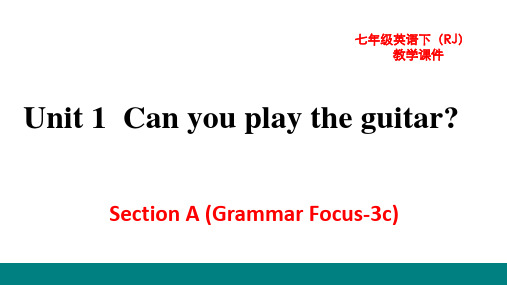
What can you do?
I can dance./I can’t sing.
What club do you want to join? We want to join the chess club.
助动词
实义动词
观察左栏句子,最后一句和前面 的句子有什么不同?
What club do you want to join? 这句话为含有实义动词want的一般现在时的句式结构。
can表“能力”用法 can表示能力时,意为“能;会”。“can+动词原形”表示
“(某人)能/会做某事”,其否定形式为“can’t/cannot+动
词原形”,表示“(某人)不能/不会做某事”。
➢I can play basketball, and my brother can play football. 我会打篮球,我哥哥会踢足球。
否定句
一般疑 问句
He can play the piano. 他会弹钢琴。
主语 + can’t/cannot + 动词原形+其他.
He can’t/cannot play the piano. 他不会弹钢琴。
Can + 主语 + 动词原形 + 其他? 肯定回答:Yes, 主语 + can. 否定回答:No, 主语 + can’t.
Read the poster.
学校(文艺)表演招募学生 show n. 演出;节目 v. 给……看;展示
play sing tell dance
Students Wanted for School Show
We want students for the school show. Can you
新目标(人教)七年级下册英语教学课件 Unit1 Section A(1a-1c)

dance sing draw swim play chess speak English play the g What can these people do? Match the activities with the
people. 1. sing _e_
Look at the picture and answer the questions.
What can you see in this picture? What clubs can you see?
n. 社团;俱乐部;兴趣小组
Can you Can she Can he
Yes, I can./No, I can’t. Yes, she can./No,she can’t. Yes, he can./No, he can’t.
➢Look! Lily is painting mountains. Jim is drawing a little pig. 看!莉莉正在画山脉,吉姆正在画一头小猪。
2. ①play chess 下国际象棋 ②play the guitar 弹吉他
play作动词的用法
【用法详解】
(1) play与棋牌类或球类名词连用,表示“参加竞技、比赛或球类
A: Yes, I can.
Listen again and answer these questions.
➢ In Conversation 1 What club does the girl want to join? Can she sing? She wants to join the music club. Yes,she can.
play the + 乐器类名词
play the guitar 弹吉他 play the piano 弹钢琴 play the violin 拉小提琴 play the drums 敲鼓
- 1、下载文档前请自行甄别文档内容的完整性,平台不提供额外的编辑、内容补充、找答案等附加服务。
- 2、"仅部分预览"的文档,不可在线预览部分如存在完整性等问题,可反馈申请退款(可完整预览的文档不适用该条件!)。
- 3、如文档侵犯您的权益,请联系客服反馈,我们会尽快为您处理(人工客服工作时间:9:00-18:30)。
七年级下Unit 1—Unit 6 巩固性练习Ⅰ. 词汇请根据中文提示完成下列各题(每空一词):1.There is a supermarket _____ _____ _____ (在附近).2.Please ______ ______(上楼) and turn left.. You can find the dance music behind the pop.3. My mother often _____ _____(去购物) on Sunday. But last Sunday she____ _____ _____(看望了我奶奶).4. When did your uncle ______ ______ (抵达) Beijing?5.Yesterday we _____ ______ ______(乘出租车)to the Culture Palace.6. My brother wants to be a ______ ______(警官). He thinks it’s _____ _____ ____ (一项令人激动的工作).Ⅱ. 选择填空( ) 1.____ is my sister. Do you like to play with ____?A. He, himB. She, herC. You, youD. I, me( ) 2. -- When and where ____ you born?-- I ____ born in Shanghai ____ September 1, 1990.A. was, were, atB. were, was, inC. was, was, onD. were, was, on( ) 3. My father likes _______ books in the evening. He doesn’t often ______ TV.A. reading, watchB. watches, seeC. to read, watchesD. looking at, see( ) 4. Pandas like eating _____ and elephants like eating ____.A. leafs, grassesB. leaves, grassC. leaf, grassD. leaves, grasses( ) 5. -- Excuse me, Where is the zoo?-- Sorry, I don’t know. Ask that policeman. He ____ know.A. shallB. needC. mayD. would( ) 6. -- Would you like something to____?-- Yes, please. A story- book.A. eatB. drinkC. washD. read( ) 7. Edward came in and said he had ____ to tell the class.A. anything importantB. important everythingC. something importantD. important something( ) 8. This problem is too difficult. ___ students can work it out.A. A fewB. FewC. A littleD. Little( ) 9. -- What did Mary have ___ breakfast this morning?-- She got up late and hurried to school ___ breakfast.A. for, withoutB. at, withoutC. for, afterD. at after( ) 10. Call Jack ___ 557,9638.He has a job for you ___ an actor.A. for, forB. at, withC. at, asD. in, asⅢ.请用方框内所给词的适当形式完成对话A: How was your weekend?B: It 1 fun.A: What did you do over the weekend?B: I 2 some classical CDs on Saturday morning. In the afternoon,I 3 soccer with my friends. On Saturday night, I 4 a comedy.On Sunday, I 5 the classical music at home.A: Where does your father work?B: He 1 at a bank. He hates this job because he 2 3 money for other people every day.A: What does he want to be?B: An actor. Now he 4 to sing and dance. He 5 it’s an interesting job.Ⅳ. 请把所给单词重新排序,组成正确的句子1. tell, the, hospital, way, me, you, could, to, the?___________________________________________2. like, his, lemonade, doesn’t, cousin.___________________________________________3. they, a, library assistant, as, you, for, have, job___________________________________________4. did, your friend, how, holiday, spend, the?________________________________________5. can, where, the, find, jazz, I, CDs?________________________________________Ⅴ. 从(B)栏中找出(A)栏中的相应答语, 并将其序号填入题前的括号中。
(A) (B)( ) 1.Who is your favorite music group? A. It wasn’t very good( ) 2. Why do you like F4? B. My favorite group is F4.( ) 3. Does Mary want to be a singer? C. Yes, I like.( ) 4. How was your holiday? D.Because they’re amazing.( ) 5. Would you like green peppers E. No she doesn’t.on your pizza? F. No, thank you.Ⅵ.阅读理解( A )阅读短文,判断其后的句子是否与短文内容相符,符合的写T, 否则写F。
The story happened in a street in an Englishtown. A policeman stops a car. In the car there is avisitor from another country. Read the conversationand do the exercise.Policeman (holding up his hand): Stop!Visitor (in car): What’s the matter?Policeman: Why are you driving on the right side ofthe road?Visitor: Do you want me to drive on the wrong side?Policeman: You are driving on the wrong side.Visitor: But you said that I was driving on the right side.Policeman: That’s right. You’re on the right., and that’s wrong.Visitor: A strange country! If right is wrong, I’m right when I’mon the wrong side. So why did you stop me?Policeman: My dear sir, you must keep to the left. The right side is the left.Visitor: It’s like a looking-glass. I’ll try to remember. Well, I want to go to Bellwood. Will you kindly tell me the way?Policeman: Certainly. At the end of this road, turn left.Visitor: Now let me think. Turn left! In England left is right, and right is wrong. Am I right? Policeman: You’ll be right if you turn left. But if you turn right, you will be wrong.Visitor: Thank you. It’s as clear as daylight.( ) 1. The visitor is driving on the left side of the road.( ) 2.The policeman stops him because he is driving on the right side of the road.( ) 3. In England you must keep to the left.( ) 4. The visitor will keep to the right and turn left.( ) 5. The visitor will keep to the left and turn left to get to Bellwood.( B )My friend, Dick, has a large police dog. Its name is Jack. Every Saturday afternoon Dick takes Jack for a long walk in the park. Jack likes these long walks very much.One afternoon, a young man came to visit my friend. He stayed a long time. He talked andtalked. Soon it was time for my friend to take Jack for a walk. But the man was still(仍然) there. Jack became very worried(着急的). He walked around the room several times and then sat down in front of the man and looked at him. But the man kept talking. Finally Jack couldn’t stand it. He went out of the room and came back a few minutes later. He sat down again in front of the man, but this time he held the man’s hat in his mouth.( ) 1. From the story, we know that Jack is ________.A. Dick’s good friendB. a large police dogC. a young manD. a young man’s dog( ) 2. Where does Dick walk his dog every Saturday afternoon?A. In his room.B. In the street.C. In the park.D. In the field.( ) 3. Jack became very worried one afternoon because ________.A. Dick couldn’t take him out for a walk at the usual timeB. a young man came to visit Dick that afternoonC. Dick walked around his room several timesD. he couldn’t find the young man’s hat( ) 4. What does the underlined word stand mean in the passage?A. 站立B.理解C.支持D. 忍受( ) 5. Why did Jack sit down again in front of the man with the hat in his mouth?A. Try to make the man laugh.B. Like the young man very much.C. Ask the young man to leaveD. Want to talk with the young man.( ) 1. How many kinds of animals are talked about in the passage?A. Four.B. Five.C. Six.D. Seven.( ) 2. Now Mr Smith is in the zoo with his two sons, one aged 14 and the other 10, how much are the tickets together?A. $ 4.00.B. $ 2.00.C. $ 3.00.D. $ 1.00.( ) 3. Which of the following is the visiting time?A. 8:30 a.m. Monday.B. 9:30a.m. Friday.C. 3:00 p.m. Sunday.D. 5.00 p.m. Tuesday.( ) 4. From the passage we can guess the animal “giraffe” must be very _________.A. fatB. longC. strongD. tall( ) 5. Which of the following can we do in the zoo?A. To give some food to the fish.B. To touch the monkey on the head.C. To throw things everywhere.D. To take a few nice photos.VII. 书面表达(A)通过调查,我们了解到你的几位同学对音乐的喜好情况,请根据下表所提供的调查情况向大__________________________________________________________________________________________________________________________________________________________________________________________________________________________________________________________________________________________________________________________________________(B) 你是人大附中(the High School Affiliated to Renmin University of China)的一名中学生。
